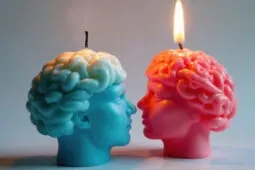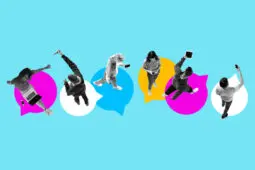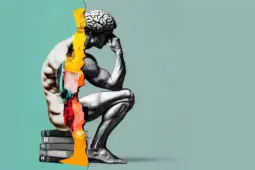Case Study
A Case of Disappearing Desire
Two Approaches to a Client with Commitment IssuesSex therapist Tammy Nelson and trauma specialist Frank Anderson take different paths to empower a client struggling with intimacy. Read more
The Case of the Busy Client
Two Approaches to Anxiety When Time is ScarceAnxiety specialist Lynn Lyons and psychologist Lindsay Gibson share unexpected approaches to working with an overwhelmed, time-starved client. Read more
Baseline Suicidality in Neurodivergent Kids
Misunderstanding Sensory and Emotional ChaosIn misdiagnosed neurodivergent teens, suicidality may not be an indicator of a desire to die but of misunderstood sensory and emotional chaos. Read more
When Memories Get in the Way
Unlearning the Truths We Tell OurselvesSometimes a client's memory may be a red herring that keeps us from focusing on what’s really important: what’s happening in the here and now. Read more
Can Communities Heal Intergenerational Trauma?
How 14 Grandmothers Inspired a Mental Health RevolutionOne psychiatrist and 14 grandmothers in Zimbabwe access a vital, untapped resource for providing mental health support. Read more
Editor's Note: May/June 2025
Exploring Therapy's Shifting Boundaries & Ethical SinkholesThis issue aims to draw attention to underlying forces having a big effect not only on the individual practices of on-the-ground therapists, but on the... Read more
How to Build Your Brand as a Therapist
9 Influencers Reveal Their Unconventional ChoicesNine successful therapists reveal their most unconventional steps to branding themselves as mental health influencers. Read more
The Ever-Shifting Norms of Psychotherapy
Four Thought Leaders on Our Evolving FieldFour thought-leaders take stock of the shifting contours of our field. Read more
The Case of the Late Client
Janina Fisher & Gabor Maté Tackle a Clinical ChallengeTwo renowned experts show you how they’d work with the same client in Psychotherapy Networker’s version of The Gloria Tapes. Read more
The founder of Brown Girl Therapy shares her countercultural secret to building an online community. Read more
Bestselling author and podcaster shows you how less can be more in branding. Read more
A renowned therapist, author and influencer challenges the popular wisdom behind branding yourself as a therapist. Read more
After landing a Masterclass series, a renowned relationship expert shares her hard-won formula for discerning what projects to accept and which to turn down. Read more
Living with a Life Coach
When Tensions Between Therapy and Coaching Hit HomeWhen a therapist's husband becomes a life coach, the push-pull widely felt in our field between similar professions gets personal. Read more
Our field's foremost brain expert connects the dots between scientific advances and our field's evolving view of mental health. Read more
One of the world's leading couples therapists examines a major turning point in couples therapy—and the woman who spearheaded the change. Read more
A therapist, author, and longtime contributor to Psychotherapy Networker reflects on our field's entrenched reluctance to name and discuss issues of race and... Read more
A renowned trauma expert tracks the historical contours of our culture's ambivalent relationship with trauma—and shares his hopes for the field. Read more
One of the world's most popular Instagram influencers offers her evolving take on social media Read more
The developer of RLT recounts the surprising path he took to write his first bestselling book. Read more
Popular podcast host and author reveals the key she discovered to showing up authentically in the public sphere. Read more
Trauma expert and author offers some key questions she used to bring meaning into branding a practice. Read more
The Venture Capitalist Playbook Is Breaking Therapy
Can Clinicians Take It Back?Mental health startups were supposed to democratize therapy. Instead, they've cut therapist pay and gutted clinical teams. How can we fight back? Read more
Why We Need a Diagnostic Revolution
Steven Hayes (ACT) on Developing a More Holistic PsychotherapyAfter a moment of crisis, ACT co-founder Steven Hayes began tearing up the floorboards of our most popular diagnostic frameworks—and what he discovered was... Read more
Starting a Coaching Practice
The Benefits of Therapists Opening a Side BusinessFor burnt-out therapists, opening a coaching business in the right way and for the right reasons can be a reinvigorating side-gig. Read more
So You Wanna Be a Life Coach?
The Legal & Ethical Risks to Your Therapy PracticeMore and more therapists are using life coaching as a workaround to the challenges of cross-state practice—but doing so can have serious consequences. Read more
Are Supervisors Failing the Field?
Why Minoritized Supervisees Are LeavingToo many minoritized supervisees are leaving the field. How do we hold on to them? Read more
The Millennial therapist who took social media by storm shares what sets her apart from other influencers. Read more
Autism Under Attack
Autism Isn't Spreading, Misinformation IsMisinformation about autism harms families, undermines progress, and diverts attention away from evidence-based practices that prevent neurodivergent burnout. Read more
Defusing Couples Conflicts with the Enneagram
A New Take on a Centuries-Old ToolBy making sense of one another’s temperamental styles through an Enneagram lens, therapists can help partners understand their differences in a new way. Read more






























